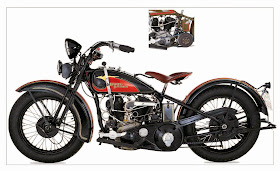 |
| Harley Davidson 1933 VLE |
SPECIFICATIONS
• ENGINE Side-valve, V-twin
• CAPACITY 74cu. in. (1213cc)
• POWER OUTPUT 22bhp
• TRANSMISSION Three-speed (optional reverse), hand shift
• FRAME Tubular cradle
• SUSPENSION Leading-link front forks, rigid rear
• WEIGHT 390lb (177kg)
• TOP SPEED 65mph (105km/h)
Harley-Davidson introduced The V-series in 1930, 14 years after rivals Indian had made their first side-valve big twins, but the bike suffered a number of teething problems. The first two months’ production had to be recalled so that new frames, flywheels, engine cases, valves, springs, and kick-start mechanisms could be changed. The work was carried out for owners free of charge, but it was a costly exercise that did little for the reputation of the V-series. After the shaky start, the side-valves evolved into rugged, fast, dependable bikes, and a VLE even went on to establish the American production bike speed record in 1933 of 104mph (167km/h). The 1933 VLE was the high-compression model in the series, with magnesium-alloy pistons providing the extra power. While only 3,700 bikes were built by Harley in 1933, this still accounted for 60 percent of all motorcycles sold in the US that year.
No comments:
Post a Comment